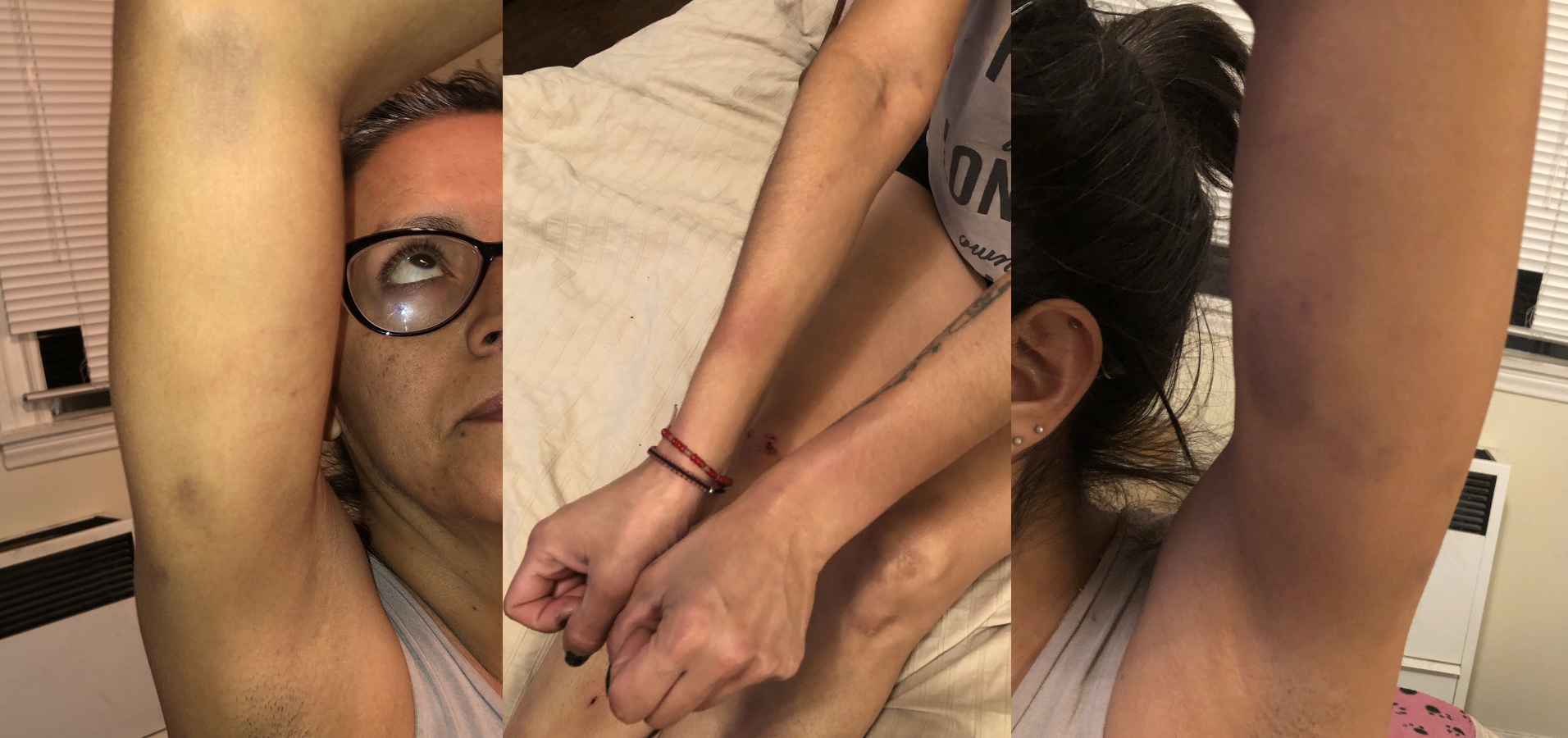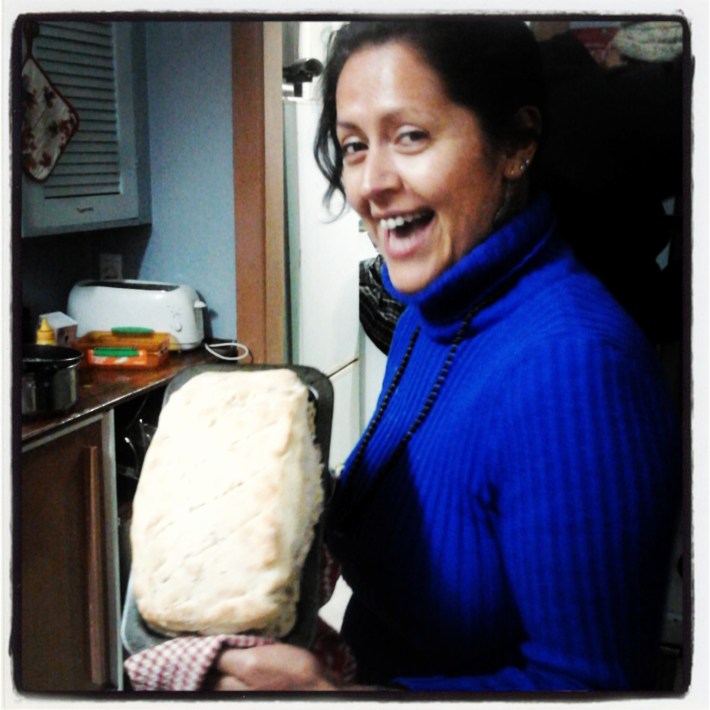"All these things are starting to pile up," said a worn down Liliana Cortez.
The October 11 trespassing arrest by officers from USC's Department of Public Safety (DPS) had cost her a job opportunity, showing up when a substitute teaching position she applied for performed a Live Scan.
And with no idea when her case might be fully resolved - at her November 8 court appearance she was handed a slip of paper saying there had been no filing to date and told charges could still be filed within a one-year period - she feels like she's trapped in a stressful limbo.
The lingering physical pain from being tackled to the ground by officers isn't helping, either. She's had to start wearing a mouth guard at night again, thanks to the way the incident aggravated her chronic TMJ issues. And her shoulder pain has made biking uncomfortable. So has the emotional trauma of it all and the fear that some of the officers might recognize her while she's out and about near campus.
She can't afford the physical therapy she needs to deal with her injuries, she says. But mental health appointments have helped with the emotional trauma that she confesses has left her at the end of her rope more than once since that night.
None of it makes any sense to her.
All she had done was hug a tree on a sorority's lawn.
She had gone out for drinks near USC after work with her friend Fermín. As they walked back towards her place near the Hoover Recreation Center around 1 a.m., they turned onto 28th - a street better known to students as part of Fraternity Row. Spotting a large old tree (below, at right) in front of one of the sorority houses, Cortez put her bike down on the lawn and crept toward the tree to admire it.
A bit buzzed, she concedes, she says she thinks she whispered loudly into the still night air that she wasn't there to do any harm and that she just wanted to see the tree.
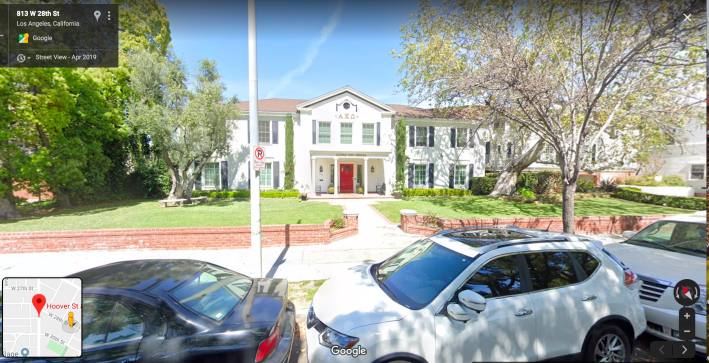
But as she wrapped her arms around the trunk, she suddenly saw USC's Department of Public Safety officers pull up and approach Fermín, who was waiting for her near the sidewalk.
The officers then made a beeline for her, yelling at her to get away from the tree.
"Are you homeless?" she says they asked. "Are you lost?"
As they pulled her off the tree, she says she tried to explain that she lived in the neighborhood - that she was a member of the community and a long-time patient at the School of Dentistry - and was just on her way home.
She knew she was in someone else's yard but hadn't meant or done any harm; she was just a nature lover that got a little carried away. She figured they'd just admonish her for being on private property and then send her and Fermín on their way.
Instead, she says, one of the officers grabbed her bike and made it clear DPS was taking the bike with them, signaling that she and Fermín were going to be put under arrest.
That's when things got out of hand.
Agitated, Cortez began arguing with the officers. The next thing she knew, she says, one had grabbed her left arm while another took her to the ground.
The whole thing happened so fast, says Fermín.
From the moment the officers had rolled up, they had been antagonistic with him and Cortez, he says, never stopping to establish what was going on or ask questions about who they were, what they were doing, or where they were headed. They didn't even heed Cortez' pleas for restraint when she said she was a mental health patient and the officers' manhandling of her was triggering her.
Instead, Cortez was suddenly on the ground with a knee "full force" in her back, writhing in pain and struggling to breathe, he says.
Cortez says that in officers' effort to restrain her, one kicked her legs. An officer observing her being restrained also pulled out a baton and threatened to use it on her if she didn't "stop and comply," she says.
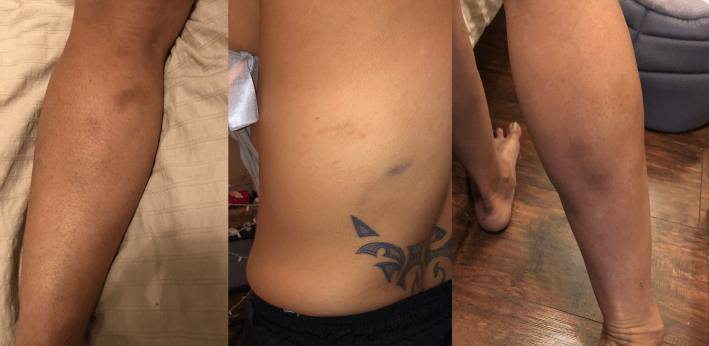
The situation continued to escalate as more DPS officers arrived on the scene, both say, with officers pushing Cortez around, insulting both of them and calling them "losers" as the two were cuffed and put in patrol vehicles.
The whole thing was "degrading and humiliating," says Fermín. And it left him "dumbfounded."
Not only was it completely unnecessary for DPS to have treated them that way, he spent two full days cooling his heels in jail for watching his friend hug a tree. Arrest records show Fermín was booked in the early hours of Friday, October 11 and not released from detention at 77th Street until noon on Sunday, the 13th.
Cortez - the one who had done the actual trespassing - was released on the night of the 11th. But by then she had missed the class for C.D. Tech's community planning academy that she had fought so hard to get into.
Her bicycle - a key source of both transportation and joy for her - did the most jail time of all. She wasn't able to pick it up from 77th until Tuesday. When she did, she found the wheel was wobbling too much for her to be able to ride it very far. DPS must have damaged it while transporting it, she surmised. The repairs to the wheel and torn up handlebar tape cost her $100.
In the days following her arrest, Cortez was unsure what to do about what she had just experienced. Like many in the community, she was both reluctant to come forward and unsure who to reach out to. She ended up telling her professor, who put her in touch with another community member, who then passed the information on to DPS.
DPS' Chief John Thomas was quick to call her, talk to her about what happened, and let her know that the case was under investigation.
Thomas, who has been at USC for over a dozen years and was with the LAPD for even longer, understood her reluctance to report her experience.
As a native of South Central who had experienced what it was like to be ignored when he and his grandmother tried to complain about his own mistreatment by law enforcement, he says he doesn't want anyone to be made to feel they don't matter or that the process will let them down.
And now that this incident has been logged - there is even body camera footage that is being reviewed, thanks to a pilot program DPS currently is running with cameras - he says she can be assured that a process to assess the officers' actions and mete out appropriate consequences has been set in motion.
The status of other key processes, however - like discussion around the kind of authority a private university's force should have in the community or investments USC has (or has not) made in building systems to track and manage its officers' behavior in the field - is harder to pin down.
Watching the Watchers
USC had significantly amped up visible security measures in the wake of the 2012 slaughter of of two Chinese graduate students in a botched carjacking and an on-campus shooting at a party that had attracted a large number of non-students. Fencing went up around campus and non-student access was restricted overnight, a fingerprint scanning system was implemented at on-campus resident halls, and 30 police officers were added to the Southwest Division.
Though USC was reportedly covering the costs of the additional police patrols, it was the community at large who would pay the heaviest price for this effort to reassure students (and especially their parents) that USC was a safe place to be.
Policing of Black and Latino residents in South Central had always been heavy handed. But reports quickly surfaced of youth being stopped and questioned about their parole or probation status multiple times a day (regardless of whether they had ever been arrested) by both LAPD and DPS.
Notably, our 2013 investigation into profiling around campus found that DPS officers were more likely than LAPD to disparage or threaten community members, unnecessarily escalate situations, and even invade their space (e.g. come up into their yards or driveways or, in the case of one youth, handcuff them to their own front gate).
To the youth, all the security theater communicated that they were not welcome either on the campus or in the community and that USC was not a resource for them. For older folks of color, who often complained of feeling like they were under surveillance every time they hung out in the street talking to their neighbors or headed to campus to use the library or the basketball courts, it sent the message that they had no rights to the neighborhood they had grown up in. And for (non-Black*) USC students on their way to class, who would pass community members being detained, cuffed, or chased out of spaces on and off campus, it sent the message that their neighbors were a threat and not part of the USC community. [*The profiling of Black students has been an ongoing problem.]
Since that time, USC has committed to pursuing diversity and inclusion more broadly, even launching a Community Advisory Board (CAB) in 2016. The purpose of the CAB, according to the Provost’s office, was to “assess campus safety and profiling issues” and ensure that DPS held to both its plan to use California’s Racial and Identity Profiling Act of 2015 as a “guide to its practices in community policing” and its promise to “voluntarily to comply with measures that address race and identity.”
Well-meaning as the launch of that effort may have been, it appears there has been little to show for all the fanfare. The board has met only a few times, leaving Chief Thomas to assume that there are no major issues with how the department is operating. And the two “community” members on it are involved in real estate and were chosen by the Provost. Neither are regularly on the ground or in contact with youth in the area, while the twitter feed of South Pasadena’s Mario Marrufo raises questions about why such an ardent fan of voices that peddle negative stereotypes about the Black community, and communities of color more generally, might be tapped to monitor discrimination.
It is also unclear what information the CAB would rely on beyond DPS' self-reporting to assess DPS’ performance.
Disparities in Treatment Compound Disrespect, Disrupt Lives
That so little has changed in the intervening years with regard to how the community at large is treated invites a level of disrespect that some residents say is pushing them to their limits.
At a community meeting with DPS and LAPD officers this past summer, neighbors went on at length about the extent to which noise complaints about parties are not heeded, public drunkenness is tolerated, students running naked through the streets or setting furniture on fire is ignored, and bad or even criminal behavior is shrugged off (like a student's theft of a cap off the head of resident Yosef Azri'el).
A look at the crime logs underscores one way this difference in standards can manifest. Where drunken students are generally released to the care of a friend or roommate and those having mental health crises are offered assistance, non-students are more likely to be checked for warrants* and arrested. [*A warrant check suggests a lengthy detention involving LAPD because while DPS can perform arrests, it can't run checks.]

Earlier this year, we documented another way this disparity plays out with the help of footage of a cyclist stopped for not having a bike light on Washington Boulevard.
Instead of being given a warning or a flyer about safety - as DPS has done with USC students - the man was cuffed, detained at length, asked about outstanding warrants, and told officers were going to call LAPD to come verify his warrant status.
The next time he went into see his parole officer, the DPS officer also told the cyclist, he would need to let him know about having been stopped by DPS.
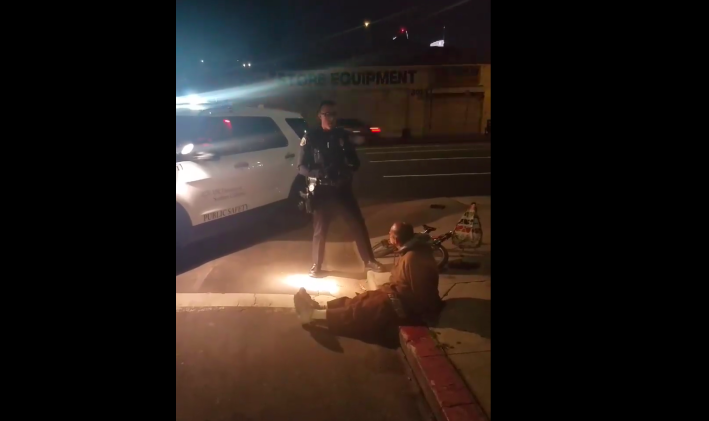
That a private university's force can have this kind of disruptive reach into non-students' lives - that it can perform pretextual stops - is hard to fathom.
That officers feel entitled to be as disparaging and as forceful as they were with Cortez and Fermín over something so minor is almost beyond comprehension.
Considering how intensely the community is surveilled - between 2012 and 2014, USC added nearly 60 security cameras, expanded its public safety patrol area significantly, and now has more than 190 video or license plate recognition cameras up - and how DPS recently upgraded its uniforms to resemble those of the LAPD, this gap in oversight of its officers is all the more glaring. And it speaks to the unchecked power USC has to shape the fate of the University Park neighborhood.
Chief Thomas has acknowledged this gap, saying that he is unlikely to know there's been a problem in the field unless someone from the community speaks up. To that end, he is known for handing out his personal phone number and telling folks to reach him directly when they have a problem with his officers. And over the years, he has spoken openly and often of his belief in the importance of accountability.
It's just not enough.
A systemic problem requires systemic, and independent, oversight. The university has an obligation to do much, much more.
Asking vulnerable people to speak up - people who already have little trust in law enforcement and who have been made to feel time and again that they will always come in second to students - is not a system. It's a cop out.
To residents, the lack of accountability and the way it allows for them to be mistreated feels like one more way USC is encouraging the conversion of area residences to student housing.
For Cortez, who knows she likely would have been sent home if officers had seen her as a member of the USC community, it's overwhelming.
As a woman of color and a first-generation immigrant, she says, she had become a teacher to make students in her shoes feel valued and like they belonged. She still can't wrap her head around being physically and emotionally traumatized and left to wonder if that 20-year career in education will be derailed because she hugged a tree.
"I'm angry about the whole situation," she says. The dehumanization, the stress, the pain, the way it's left her feeling defeated about the future - all of it. She has a million questions, each having to do with how something like this could happen, how officers could be given this kind of license, how DPS will be held accountable, and how community members will feel to see pictures of her bruised and battered body and to know USC could do the same to them.
Then she pauses to take a breath and settles on the one question that lies at the root of all her concerns.
"How is USC going to make it right?"
*****
Cortez has filed a complaint with USC and the case is currently under investigation. Officers have acknowledged that some of the language used during the arrest of Cortez and Fermín was inappropriate, but the rest of the case and the body camera footage is still under review. We will update readers when we know more. For previous coverage of policing around USC, see:
- February, 2019: Handcuffing of Cyclist by USC Public Safety Raises Questions about Tactics, Oversight, Accountability
- May, 2013: A Tale of Two Communities, Part II: LAPD Finds it Stirred Up Hornets’ Nest by Profiling USC Students of Color
- April, 2013: A Tale of Two Communities: New Security Measures at USC Intensify Profiling of Lower-Income Youth of Color
- January, 2013: How Far is Too Far?: Fortress USC and the Struggle to Keep Students Safe
